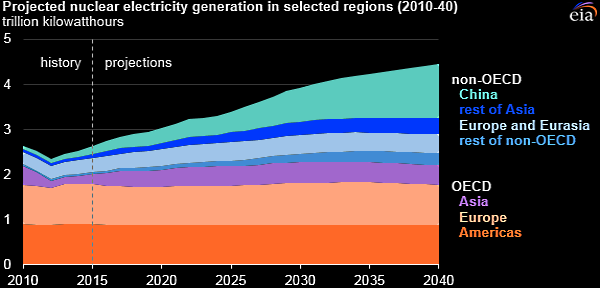
EUROPEAN NUCLEAR POWER

WNN - By combining flexible nuclear power plant operation with the use of variable renewable energy sources, Europe will be able to ensure security of energy supply while reducing its greenhouse gas emissions, according to the European nuclear trade body Foratom. However, it calls for an EU energy policy that creates the right market and regulatory conditions for this to happen.
Brussels-based Foratom noted there is a general misconception that nuclear can only provide baseload energy. However, nuclear power plants can also be operated flexibly, "providing a large-scale solution to the need for network stability and flexibility". According to the trade group, "Analysis shows for a fact that [nuclear power plants and variable renewable energy sources] can be highly complementary if the right framework is adapted.
"Technically, existing nuclear power plants and new designs can perform both frequency control and load-following operations but practices are heterogeneous in the EU," Foratom said yesterday. "In some Member States or regions, there is currently no need or incentives for flexible operations of nuclear power plants. In other Member States, flexible operations of nuclear power plants is a standing and proven practice."
In a new position paper, Foratom noted that nuclear power plants have been operated flexibly in several European countries, including France, Germany, Slovakia and the Czech Republic.
"To date, two-thirds of nuclear power plants in France have been operated routinely in flexible mode," it said. "This has demonstrated on a grand scale the ability of nuclear energy to balance the intermittency of variable renewables. Actually, nuclear energy appears as being the only large-scale, non-weather dependent low-carbon technology that is capable of doing so."
However, Foratom noted the decision to perform load-following depends very much on how flexibility is valued by the national electricity market and on legal/regulatory constraints.
Andrei Goicea, Foratom Executive Manager, said: "When it comes to nuclear flexibility, two elements need to be taken into consideration: the regulatory framework (which can vary from one Member State to another), and the market environment."
Foratom says the EU needs "a well-functioning electricity market recognising the specificities of long-term investments in low-carbon energy sources and a functioning EU Emissions Trading Scheme delivering a long-term and predictable carbon price". This, it claims, "would lead to a level playing field for all low-carbon energy sources in a market where subsidies were not needed. In such a market, a proper reward for flexibility would encourage nuclear power plant operators to operate in a flexible way".
Yves Desbazeille, Foratom director general, added: "If Europe is serious about reducing its CO2 emissions whilst at the same time ensuring security of supply, then it needs to take low-carbon nuclear energy seriously as a flexible partner for renewables."
In April 2017, Foratom published a position paper on the European Commission's 'Clean Energy for All Europeans' package of measures for a clean energy transition. The organisation said the EU's aim to decarbonise the economy by more than 80% by 2050 cannot be achieved without nuclear power.
The 128 nuclear power reactors - with a combined capacity of 119 GWe - currently operating in 14 of the 28 EU Member States account for more than one-quarter of the electricity generated in the whole of the EU.
-----
Earlier:

2018, April, 4, 09:40:00
RUSSIA - TURKEY NUCLEAR: $20 BLNWNN - The $20 billion project to build the four-unit, 4800 MWe plant is part of Erdogan's '2023 Vision' marking 100 years since the founding of modern Turkey and is intended to reduce the country's dependence on energy imports. The first unit is scheduled to start operations that year, with the other three units following by 2025. The plant is expected to meet about 10% of Turkey's electricity needs. |

2018, March, 28, 10:40:00
FRANCE'S NUCLEAR SECURITYWNN - France has demonstrated a strong commitment to nuclear security, according to the International Atomic Energy Agency (IAEA). The Vienna-based agency carried out a two-week International Physical Protection Advisory Service (IPPAS) follow-up mission at the French government's request. |

2018, March, 14, 11:10:00
NUCLEAR FUEL FOR EUROPEWNN - A consortium led by Westinghouse Electric Company has completed an EU-funded project aimed at diversifying the supply of fuel to Russian-built VVER-440 reactors in Europe. |

2018, January, 24, 11:40:00
EU NUCLEAR POWER - 2017WNA -The EU is the largest energy importer in the world, importing 53% of its energy, at an annual cost of around €400 billion. |

2018, January, 15, 09:35:00
BRITAIN'S NUCLEAR BREXITWNN - The UK government aims to maintain as many of the benefits the country has enjoyed from its membership of the European Atomic Energy Community since joining the EU and Euratom in 1973 through a "close and effective association" in the future, Greg Clark, secretary of state for business, energy and industrial strategy told Parliament yesterday. The UK will exit Euratom at the same time as withdrawing from the EU, on 29 March 2019. |

2017, December, 13, 12:05:00
FRENCH THERMONUCLEAR REACTORWNN - Construction of the Iter fusion reactor, being built at Cadarache in the south of France, is now 50% complete, the Iter Organisation has announced. The reactor - construction of which began in 2010 - is scheduled to achieve first plasma in 2025.
|

2017, February, 28, 18:55:00
ЗЕЛЕНАЯ ЭКОНОМИКА РОССИИДоля атомной энергетики в общем объёме энергобаланса страны – 16-17%, гидрогенерации – 18%, газ - порядка 40%. Несмотря на то, что на сегодняшний день в России оптимальный энергетический баланс, Минэнерго России будет его менять в сторону увеличения объемов возобновляемых источников энергии. «Сейчас это 0,2%. Планируем выйти на 3% - до 6 тысяч МВт за счёт различных механизмов поддержки ВИЭ», - резюмировал Александр Новак. |












